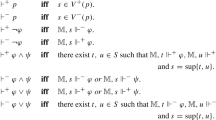Abstract
This papers deals with the class of axiomatic theories of truth for semantically closed languages, where the theories do not allow for standard models; i.e., those theories cannot be interpreted as referring to the natural number codes of sentences only (for an overview of axiomatic theories of truth in general, see Halbach[6]). We are going to give new proofs for two well-known results in this area, and we also prove a new theorem on the nonstandardness of a certain theory of truth. The results indicate that the proof strategies for all the theorems on the nonstandardness of such theories are "essentially" of the same kind of structure.
Similar content being viewed by others
References
Chang, C.C., H.J. Keisler, Model Theory, Amsterdam, North-Holland, 1990.
Friedman, H., M., Sheard, 'An axiomatic approach to self-referential truth', Annals of Pure and Applied Logic 33 (1987): 1-21.
GÖdel, K., “Über formal unentscheidbare Sätze der Principia Mathematica und verwandter Systeme I', Monatshefte für Mathematik und Physik 38 (1931): 173-198.
Gupta, A., N. Belnap, The Revision Theory of Truth (Cambridge, Massachusetts: The MIT Press, 1993).
Halbach, V., 'A system of complete and consistent truth', Notre Dame Journal of Formal Logic 35/3 (1994): 311-327.
Halbach, V., Axiomatische Wahrheitstheorien, Berlin, Akademie Verlag, 1996.
Hardy, J., 'Is Yablo's paradox Liar-like?', Analysis 55.3 (1995), 197-198.
Henkin, L., 'A generalization of the concept of w-Consistency', Journal of Symbolic Logic 19 (1954), 183-196.
Leitgeb, H., 'Truth as translation', Forschungsbericht der DFG-Forschergruppe Logik in der Philosophie 44 (1999); submitted for publication.
McCarthy, T., 'Ungroundedness in classical languages', Journal of Philosophical Logic 17 (1988): 61-74.
McGee, V., 'How truthlike can a predicate be? A negative result', Journal of Philosophical Logic 14 (1985): 399-410.
Montague, R., 'Syntactic treatments of modality, with corollaries on reflexion principles and finite axiomatizability', Acta Philosophica Fennica 16 (1974), 153-167.
Orey, S., 'On w-consistency and related properties', Journal of Symbolic Logic 21 (1956): 246-252.
Tarski, A., 'Der Wahrheitsbegriff in den formalisierten Sprachen', Studia Philosophica 1 (1935): 261-405.
Tarski, A., Mostowski, A., Robinson, R.M., Undecidable Theories (Amsterdam: North Holland, 1953).
Visser, A., 'Semantics and the Liar Paradox', Handbook of Philosophical Logic, Vol. IV (1989): 617-706.
Yablo, S., 'Paradox without self-reference', Analysis 53 (1993): 251-252.
Author information
Authors and Affiliations
Rights and permissions
About this article
Cite this article
Leitgeb, H. Theories of Truth Which Have No Standard Models. Studia Logica 68, 69–87 (2001). https://doi.org/10.1023/A:1011950105814
Issue Date:
DOI: https://doi.org/10.1023/A:1011950105814



